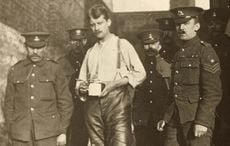| Irish playwright Jimmy Kerr |
But House Strictly Private, a pitch-black comic drama, is an unexpected follow up to Kerr's rollicking festival debut. Tackling the subject of an Irish wake, the play at first unfolds with deceptive simplicity. Kerr introduces us to the McCracken family, who have gathered on the death of their uncle, whose early passing has not been anticipated. Coming together for the first time in years, they must confront the past and what it has made of them.
Kerr is a northern playwright and so he has an engaged sense of just how thorny and intractable the past can be, and how hard it can be to create a shared future when confronted with truths that can seem insurmountable. He certainly doesn't make it easy on his characters, whose lives and choices are revealed in panels that add dimension and layer to this uniquely thoughtful drama.
How am I going to live now? That's the question that hunts each of the blasted survivors of the destructive hurricane that was their uncle's life.
It's a hard question for a play that includes genuinely comic moments, and yet Kerr manages to wield the material with real skill. In particular he's good at offsetting your expectations with revelations that take you in directions you never anticipated.
Betrayal and how to contend with it is at the heart of House Strictly Private. Whether it's betrayal in love, or the way parents can betray their offspring, or the way society can betray its most vulnerable to the wrath of the strong, what engages the playwright is how long injustice can leave a legacy before the courage or the resolve is found to start again.
Although abuse is the theme that ties the generations together here, stepping out from its shadow is the unexpected option that makes this play both timely and indisputably Irish. Even the most broken family can cobble together a future from the glass shards of the past.
Kerr's characters are remarkable in their desire to live and their desire to heal. He also reminds us that nothing is funnier than suffering, and that if you can stand it -- and you should try to stand it -- a day will come when you may think so yourself.
The savagery that is unleashed on his characters when they're least equipped to withstand it finds its match in their determination to move beyond it. I have rarely seen the North's determination to contend with its past and find its future so memorably and movingly portrayed on a stage.
For Love, by debut playwright Laoisa Sexton, is the most impressive first play I have seen in two decades. Featuring a flawless cast that included the writer herself, the play took us on a whirlwind tour of contemporary Dublin seen from a young woman's perspective in a way that was so authentic and casually funny that it disarmed you from the first scene.
Sexton writes with humor and real passion about the actual lives of young women, crafting dispatches from the trenches that tell it like it happens, and you realize as you’re watching it just how unusual that is in the all-too male dominated craft of Irish playwriting.
Sexton's writing is highly crafted, smart but straight from life and it frees her actors up to give arrestingly rich performances, which they do. Jo Kinsella, Georgina McKevitt, John Duddy and the playwright herself are pitch perfect from start to finish, owning the language like they own the play.
McKevitt is particularly funny in her underplayed and subtle characterization of a bored housewife redeemed by shopping. Kinsella is a revelation as a good time girl who suspects the good times are coming to an end, and she finds both the scalding ironies and the unforgettable gags lurking in each scene so expertly that she had the audience applauding her mid speech. Both these actresses bring lived experience to the stage and enrich the show with them.
Sexton conveys a nervy defensiveness and vulnerability on stage that makes her impossible to look away from. Playing a character who has had her heart broken so completely that she holds everyone and everything at a remove, Sexton's female characters are the most interesting and most recognizably Irish I have seen on an Irish stage in years.
The 1st Irish Theatre Festival deserves accolades for bringing these talents to an American stage, and Irish drama has been enriched by their appearance.




Comments